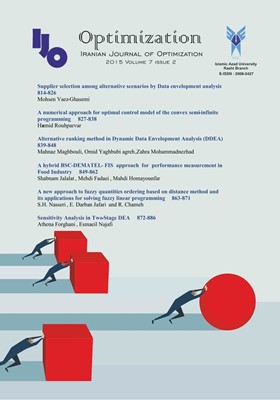Alternative ranking method in Dynamic Data Envelopment Analysis (DDEA)
Subject Areas : Data Envelopment AnalysisMahnaz Maghbouli 1 , Omid Yaghbubi Agreh 2 , Zahra Mohammadnezhad 3
1 -
2 -
3 -
Keywords: DEA, Ranking, Efficiency, dynamic DEA (DDEA), DMU,
Abstract :
The motivation of this paper is to propose such equitable method for ranking all decision making units (DMUs) in dynamic Data Envelopment Analysis (DDEA) framework. As far as we are aware there is not more studies in dynamic DEA literature. What's more, in such cases the best operating unit is important to be sampled for the others in under evaluated time periods. However, in this special concept of DEA, quasi-fixed inputs or intermediate products are the source of inter temporal dependence between consecutive periods. Hence, in order to have suitable ranking for units operating in dynamic environment the minimum and maximum efficiency values of each DMU in dynamic state are computed. Also, we assume that the sum of efficiency values of all DMUs in dynamic state is equal to unity. Thereafter, the rank of each DMU is determined through the combination of its maximum and minimum efficiency values. A real case of Iranian gas companies highlights the applicability of the proposed method in Dynamic framework.
[1] A.Charnes, W.W.Cooper, E.Rhodes. 1978. Measuring the efficiency of DMUs, European Journal of Operational Research, 2, 429-444.
[2] R.D.Banker, A.Charnes, W.W.Cooper.1984. Some models for estimating technical and scale inefficiencies in DEA, Management Science, 30, 1078-1092.
[3] R.Fare, S.Grosskopf, R.Brannlund and others.1996. Inter temporal Production Frontiers: with Dynamic DEA. Kluwer Academic Press .Boston.
[4] G.A.Klopp. 1985. The analysis of the efficiency of production system with multiple inputs and outputs. Industrial and system Engineering College, Chicago.
[5] S.Malmquist.1953. Index numbers and indifferences surface, Trabajos de Estadistica, 4, 209-242.
[6] J.Nemoto, M.Goto.1999. Dynamic DEA: Modeling inter temporal behavior of a firm in the presence of productive inefficiencies, Economic Letters, 64, 51-56.
[7] T.Sueyoshi, K.Sekitani.2005. Returns to scale in dynamic DEA, European Journal of Operational Research, 161, 536-544.
[8] K.Tone, M.Tsutsui.2009. Network DEA: a slack-based measure approach, European Journal of Operational Research, 197, 243-252.
[9] C.Kao, S.N.Hwang.2010. Efficiency measurement for network system: IT impact on firm performance, Decision Support System, 48, 437-446.
[10] C.Kao,” Dynamic data envelopment analysis framework”, European Journal of Operational Research .2013, In Press.
[11] A.Amirteimoori.2006. Data envelopment analysis in dynamic framework, Applied Mathematics and Computation, 181, 21-28.
[12] M.Khodabakhshi, K.Aryavash.2012. Ranking all units in data envelopment analysis, Applied Mathematics Letters, 25, 2066-2070.


